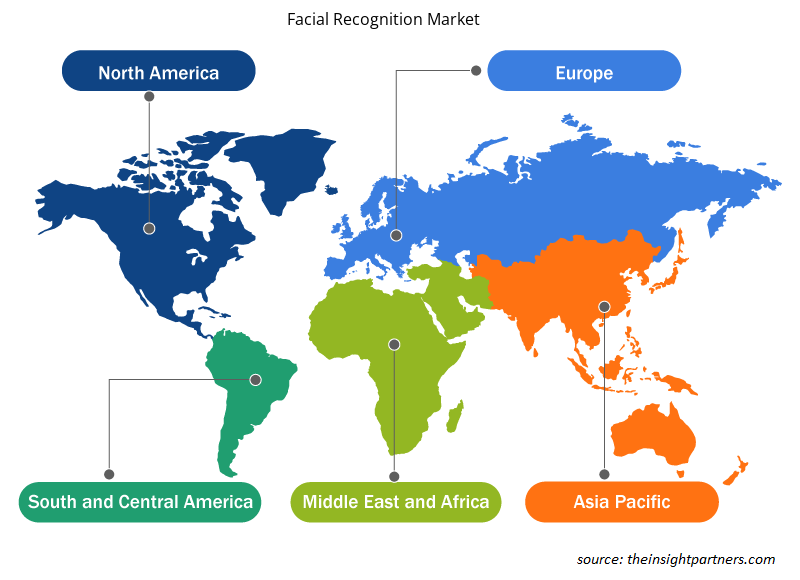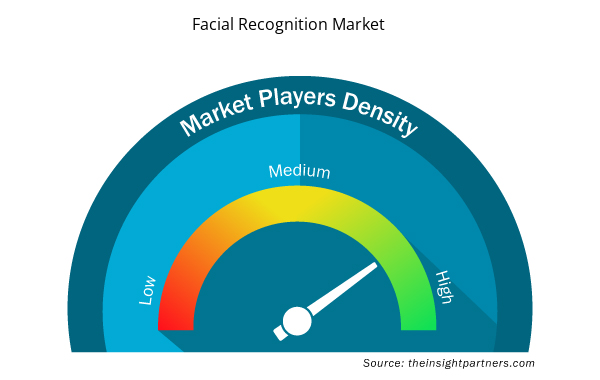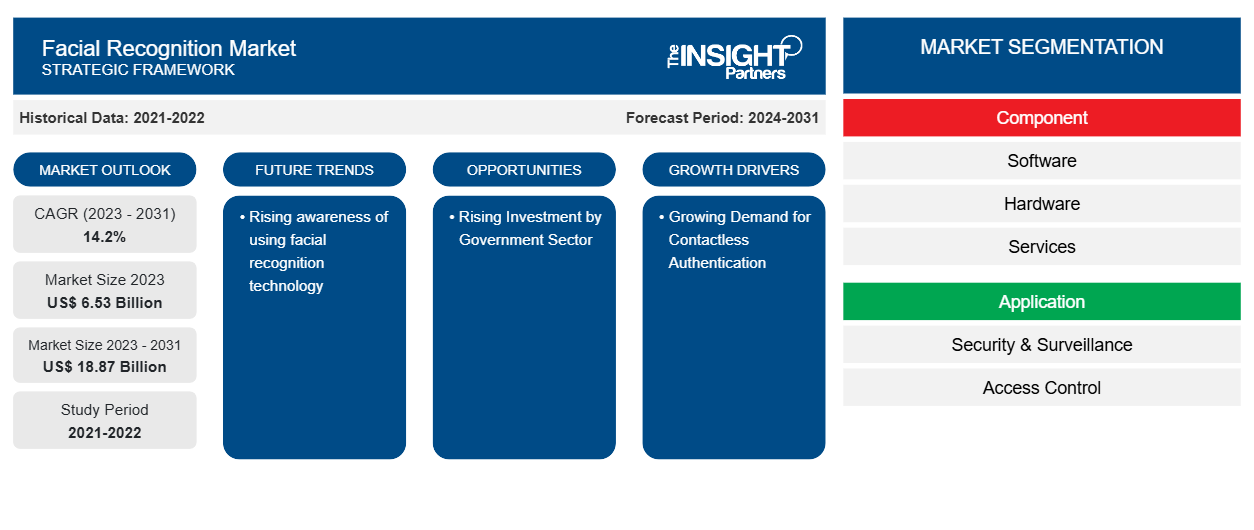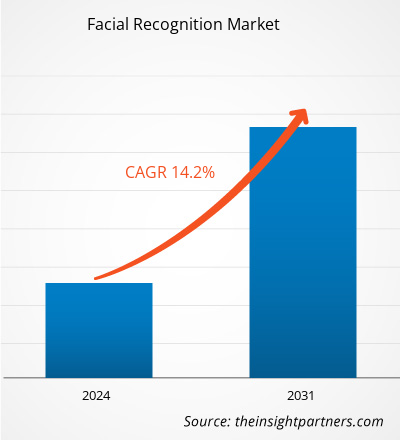面部识别市场规模预计将从 2023 年的 65.3 亿美元增至 2031 年的 188.7 亿美元。预计 2023-2031 年期间的复合年增长率为 14.2%。CAGR of 14.2% during 2023–2031. 人们对使用面部识别技术的认识不断提高,这可能仍会成为市场的一个主要趋势。
面部识别市场分析
对有效视频监控系统的需求不断增长,推动了对面部识别技术的需求。安全和执法、医疗保健、零售和运输等行业正在采用面部识别技术来提高安全性。
面部识别市场概况
人脸识别是一种生物识别软件,利用人的面部特征来验证身份。人脸识别是安全系统中用于识别特定人员或用户的典型方法。人脸识别最常见的应用之一是解锁手机。该技术还用于警察执法、视频监控和乘客筛查。人脸识别以数学方式映射人的面部特征,并将结果存储为人脸指纹。为了验证个人身份,该程序使用深度学习技术将不同的视频或数字图片与存储的人脸指纹数据库进行比较。
定制此报告以满足您的需求
您可以免费定制任何报告,包括本报告的部分内容、国家级分析、Excel 数据包,以及为初创企业和大学提供优惠和折扣
- 获取此报告的关键市场趋势。这个免费样品将包括数据分析,从市场趋势到估计和预测。
面部识别市场驱动因素和机遇
非接触式认证需求不断增长,市场前景看好
随着对非接触式身份验证技术的需求不断增长,高分辨率摄像头的出现以及配备人脸识别功能的智能手机的使用日益增多,人脸识别行业正在向前发展。该技术可用于各种行业,包括监控、银行、机场和门禁。预计该市场将创造巨大的收入,并将在未来几年继续增长。
政府部门投资增加
政府部门包括各种政府设施、国防设施、市政当局、公用事业站等。由于对国家安全的日益重视,世界各国政府都在大力投资面部识别系统等先进的 安全 解决方案。此外,对发展智慧城市的日益重视也是促使采用面部识别系统来增强安全和监控应用的其他因素之一,这推动了面部识别市场的增长。
面部识别市场报告细分分析
有助于得出面部识别市场分析的关键部分是组件、应用和垂直。
- 根据组件,市场分为软件、硬件和服务。硬件部分在 2023 年占据了相当大的市场份额。
- 根据应用,市场细分为安全与监控、访问控制和其他。安全与监控部门在 2023 年占据了更大的市场份额。
- 根据垂直行业,市场细分为 BFSI、零售和电子商务、政府、医疗保健、教育、汽车和运输等。BFSI 部门在 2023 年占据了最大的市场份额。
面部识别市场份额按地区分析
面部识别市场报告的地理范围主要分为五个区域:北美、亚太、欧洲、中东和非洲、南美和中美。
2023 年,北美占据市场主导地位。因此,任何对行业增长的影响都预计将对该地区经济增长产生负面影响。尽管美国有多个州和地方法规对面部识别技术进行监管,但迫在眉睫的冲突仍然存在。由于企业对面部识别的投资增加和热情高涨,预计未来几年面部识别将大幅增长。与此同时,美国立法者和隐私组织对该技术的潜在社会影响表示担忧,并主张加强监管。
面部识别市场区域洞察
Insight Partners 的分析师已详细解释了预测期内影响面部识别市场的区域趋势和因素。本节还讨论了北美、欧洲、亚太地区、中东和非洲以及南美和中美洲的面部识别市场细分和地理位置。

- 获取面部识别市场的区域特定数据
面部识别市场报告范围
| 报告属性 | 细节 |
|---|---|
| 2023 年的市场规模 | 65.3亿美元 |
| 2031 年市场规模 | 188.7亿美元 |
| 全球复合年增长率(2023 - 2031) | 14.2% |
| 史料 | 2021-2022 |
| 预测期 | 2024-2031 |
| 涵盖的领域 | 按组件
|
| 覆盖地区和国家 | 北美
|
| 市场领导者和主要公司简介 |
|
面部识别市场参与者密度:了解其对业务动态的影响
面部识别市场正在快速增长,这得益于终端用户需求的不断增长,这些需求源于消费者偏好的不断变化、技术进步以及对产品优势的认识不断提高等因素。随着需求的增加,企业正在扩大其产品范围,进行创新以满足消费者的需求,并利用新兴趋势,从而进一步推动市场增长。
市场参与者密度是指在特定市场或行业内运营的企业或公司的分布情况。它表明在给定市场空间中,相对于其规模或总市场价值,有多少竞争对手(市场参与者)存在。
在面部识别市场运营的主要公司有:
- 科技5
- 艾迪米
- Aware 公司
- 认知系统有限公司
- Ayonix 公司
- 富士通有限公司
免责声明:上面列出的公司没有按照任何特定顺序排列。

- 了解面部识别市场主要参与者概况
面部识别市场新闻和最新发展
面部识别市场通过收集一手和二手研究后的定性和定量数据进行评估,其中包括重要的公司出版物、协会数据和数据库。以下列出了面部识别市场的一些发展情况:
- IDEMIA 发布了其最新的门禁人脸识别解决方案 VisionPass SP。IDEMIA 通过 VisionPass SP 丰富了其产品线,这是一款时尚紧凑的终端,采用环保设计,可提供准确、公平的匹配结果。(来源:IDEMIA,新闻稿,2024 年 1 月)
- BAXE 和 Haventec 与 IDEMIA 合作,推出了首个使用面部认证解决方案进行身份识别的区块链生态系统。(来源:BAXE,新闻稿,2022 年 1 月)
面部识别市场报告覆盖范围和交付成果
“面部识别市场规模和预测(2021-2031)”报告对以下领域进行了详细的市场分析:
- 面部识别市场规模以及范围涵盖的所有主要细分市场的全球、区域和国家/地区预测
- 面部识别市场趋势以及市场动态,如驱动因素、限制因素和关键机遇
- 详细的 PEST/波特五力分析和 SWOT 分析
- 面部识别市场分析涵盖主要市场趋势、全球和区域框架、主要参与者、法规和最新市场发展
- 行业格局和竞争分析,涵盖市场集中度、热图分析、知名参与者以及面部识别市场的最新发展
- 详细的公司简介
- 历史分析(2 年)、基准年、预测(7 年)及复合年增长率
- PEST 和 SWOT 分析
- 市场规模价值/数量 - 全球、区域、国家
- 行业和竞争格局
- Excel 数据集



Report Coverage
Revenue forecast, Company Analysis, Industry landscape, Growth factors, and Trends

Segment Covered
This text is related
to segments covered.

Regional Scope
North America, Europe, Asia Pacific, Middle East & Africa, South & Central America

Country Scope
This text is related
to country scope.
常见问题
North America dominated the facial recognition market in 2023.
The growing requirement for effective video surveillance systems is driving up demand for facial recognition technologies. Facial recognition technology is being adopted by industries such as security and law enforcement, healthcare, retail, and transportation to improve security and safety.
The rising awareness of using facial recognition technology is likely to remain a key trend in the market.
Tech5, IDEMIA, Aware Inc., Cognitec Systems GmbH, and Ayonix Corporation are among the leading facial recognition market.
The estimated value of the facial recognition market is expected to reach US$ 18.87 billion by 2031.
The market is expected to grow at a CAGR of 14.2% over the forecast period.
Trends and growth analysis reports related to Technology, Media and Telecommunications : READ MORE..
The Insight Partners performs research in 4 major stages: Data Collection & Secondary Research, Primary Research, Data Analysis and Data Triangulation & Final Review.
- Data Collection and Secondary Research:
As a market research and consulting firm operating from a decade, we have published and advised several client across the globe. First step for any study will start with an assessment of currently available data and insights from existing reports. Further, historical and current market information is collected from Investor Presentations, Annual Reports, SEC Filings, etc., and other information related to company’s performance and market positioning are gathered from Paid Databases (Factiva, Hoovers, and Reuters) and various other publications available in public domain.
Several associations trade associates, technical forums, institutes, societies and organization are accessed to gain technical as well as market related insights through their publications such as research papers, blogs and press releases related to the studies are referred to get cues about the market. Further, white papers, journals, magazines, and other news articles published in last 3 years are scrutinized and analyzed to understand the current market trends.
- Primary Research:
The primarily interview analysis comprise of data obtained from industry participants interview and answers to survey questions gathered by in-house primary team.
For primary research, interviews are conducted with industry experts/CEOs/Marketing Managers/VPs/Subject Matter Experts from both demand and supply side to get a 360-degree view of the market. The primary team conducts several interviews based on the complexity of the markets to understand the various market trends and dynamics which makes research more credible and precise.
A typical research interview fulfils the following functions:
- Provides first-hand information on the market size, market trends, growth trends, competitive landscape, and outlook
- Validates and strengthens in-house secondary research findings
- Develops the analysis team’s expertise and market understanding
Primary research involves email interactions and telephone interviews for each market, category, segment, and sub-segment across geographies. The participants who typically take part in such a process include, but are not limited to:
- Industry participants: VPs, business development managers, market intelligence managers and national sales managers
- Outside experts: Valuation experts, research analysts and key opinion leaders specializing in the electronics and semiconductor industry.
Below is the breakup of our primary respondents by company, designation, and region:

Once we receive the confirmation from primary research sources or primary respondents, we finalize the base year market estimation and forecast the data as per the macroeconomic and microeconomic factors assessed during data collection.
- Data Analysis:
Once data is validated through both secondary as well as primary respondents, we finalize the market estimations by hypothesis formulation and factor analysis at regional and country level.
- Macro-Economic Factor Analysis:
We analyse macroeconomic indicators such the gross domestic product (GDP), increase in the demand for goods and services across industries, technological advancement, regional economic growth, governmental policies, the influence of COVID-19, PEST analysis, and other aspects. This analysis aids in setting benchmarks for various nations/regions and approximating market splits. Additionally, the general trend of the aforementioned components aid in determining the market's development possibilities.
- Country Level Data:
Various factors that are especially aligned to the country are taken into account to determine the market size for a certain area and country, including the presence of vendors, such as headquarters and offices, the country's GDP, demand patterns, and industry growth. To comprehend the market dynamics for the nation, a number of growth variables, inhibitors, application areas, and current market trends are researched. The aforementioned elements aid in determining the country's overall market's growth potential.
- Company Profile:
The “Table of Contents” is formulated by listing and analyzing more than 25 - 30 companies operating in the market ecosystem across geographies. However, we profile only 10 companies as a standard practice in our syndicate reports. These 10 companies comprise leading, emerging, and regional players. Nonetheless, our analysis is not restricted to the 10 listed companies, we also analyze other companies present in the market to develop a holistic view and understand the prevailing trends. The “Company Profiles” section in the report covers key facts, business description, products & services, financial information, SWOT analysis, and key developments. The financial information presented is extracted from the annual reports and official documents of the publicly listed companies. Upon collecting the information for the sections of respective companies, we verify them via various primary sources and then compile the data in respective company profiles. The company level information helps us in deriving the base number as well as in forecasting the market size.
- Developing Base Number:
Aggregation of sales statistics (2020-2022) and macro-economic factor, and other secondary and primary research insights are utilized to arrive at base number and related market shares for 2022. The data gaps are identified in this step and relevant market data is analyzed, collected from paid primary interviews or databases. On finalizing the base year market size, forecasts are developed on the basis of macro-economic, industry and market growth factors and company level analysis.
- Data Triangulation and Final Review:
The market findings and base year market size calculations are validated from supply as well as demand side. Demand side validations are based on macro-economic factor analysis and benchmarks for respective regions and countries. In case of supply side validations, revenues of major companies are estimated (in case not available) based on industry benchmark, approximate number of employees, product portfolio, and primary interviews revenues are gathered. Further revenue from target product/service segment is assessed to avoid overshooting of market statistics. In case of heavy deviations between supply and demand side values, all thes steps are repeated to achieve synchronization.
We follow an iterative model, wherein we share our research findings with Subject Matter Experts (SME’s) and Key Opinion Leaders (KOLs) until consensus view of the market is not formulated – this model negates any drastic deviation in the opinions of experts. Only validated and universally acceptable research findings are quoted in our reports.
We have important check points that we use to validate our research findings – which we call – data triangulation, where we validate the information, we generate from secondary sources with primary interviews and then we re-validate with our internal data bases and Subject matter experts. This comprehensive model enables us to deliver high quality, reliable data in shortest possible time.


 获取此报告的免费样本
获取此报告的免费样本